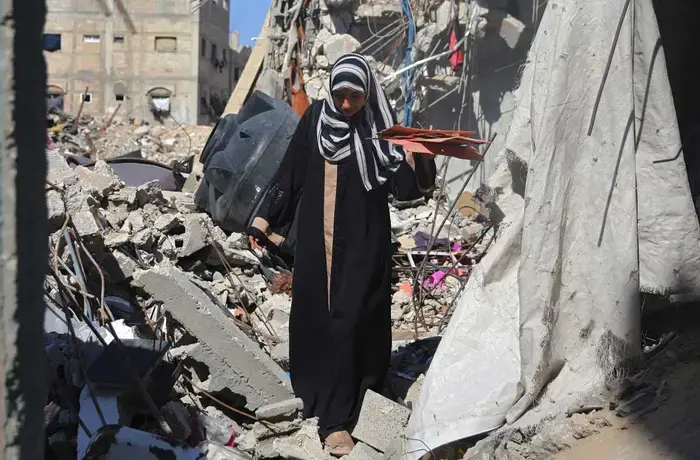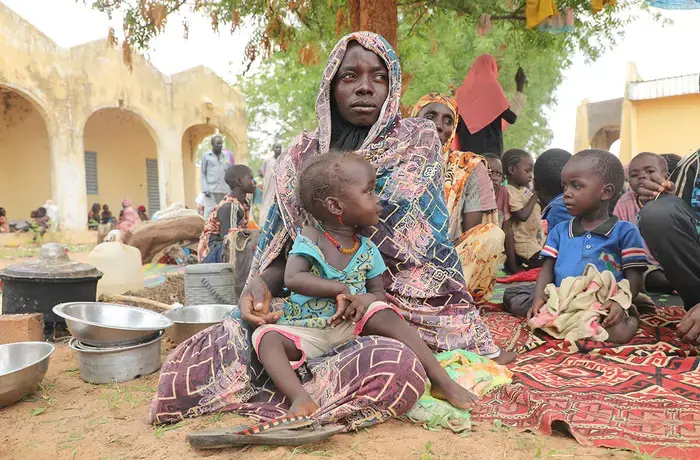Gender equality in peacekeeping: Why it matters for global security
To build lasting peace around the world, we must consider the specific impacts of conflict on women—and empower them to lead peace efforts.
Through its peacekeeping efforts, the United Nations helps conflict-torn areas move towards lasting peace. Soldiers, police officers, and civilian personnel all serve in peacekeeping under the UN flag.
Peacekeeping is more effective when it considers the different ways that women, men, boys, and girls are affected by conflict. To achieve this, we need to employ and empower more women as peacekeepers, as well as ensure women in conflict zones are protected from harm, can safely access justice and services, and have a say in the decisions that impact them.
When women lead, peace follows. UN Women helps drive the United Nations Women, Peace and Security (WPS) agenda with research, training, and programmes that remove barriers to women’s participation in all levels of peacekeeping.

Why is gender equality important in peacekeeping contexts?
When peacekeeping efforts take into account the unique needs, contributions, and perspectives of all people, they better protect local communities. This diversity in thinking about long-standing problems leads to more innovative and durable solutions to conflict.
Employing women in peacekeeping operations—and leadership—plays a major role in improving the effectiveness of peacekeeping. Women peacekeepers work in all functions, including patrols, security checkpoints, intelligence gathering, law enforcement, and community engagement.
One key aspect of peacekeeping is building trust with local communities, making it easier to gather information about threats or abuses, and to prevent the escalation of conflict within communities. The presence of women peacekeepers encourages local women to participate in dialogues and open up about the issues they face, including sexual and gender-based violence. They are also important role models for local women and girls.
“There is balance in everything in nature”, said Lieutenant Colonel Rubana Nowshin Mithila in an interview with UN Women. “Peacekeeping missions too need balanced representation.” Lt. Colonel Rubana, a military officer with the Bangladeshi army, has served with UN Peacekeeping in Côte d’Ivoire and South Sudan.
“Women peacekeepers are more attuned to the special needs of the women and girls in the communities,” she added. “The local women open up to them.”

How are women and girls uniquely affected by conflict?
Women and girls are disproportionately impacted by sexual violence in conflict areas—accounting for 95 per cent of the cases that are reported. As primary caretakers and food producers in their families, women are especially affected by forced displacement, food insecurity, restricted access to jobs and education, and attacks on healthcare infrastructure, including sexual and reproductive care.
Unfortunately, not only is the number of armed conflicts around the world rising, but the proportion of women killed in these zones doubled between 2022 and 2023.
How well are women represented in peacekeeping roles today?
Despite these dangerous impacts, women are significantly underrepresented in the security sector, including peacekeeping, and remain at the periphery of peace processes. As of January 2025:
- Only 10 per cent of UN uniformed peacekeeping personnel are women.
- Women account for just 8.8 per cent in military roles and 21 per cent in police roles.
- 97 per cent of generals or equivalent ranks are men, and fewer than 1 in 10 senior officers are women.
In what ways do women contribute to peacebuilding beyond peacekeeping missions?
UN Peacekeeping Operations, which are based on mandates from the UN Security Council, are distinct from other UN-led peace processes, including peace talks and community-based peacebuilding.
But all means of fostering peace and ending violence benefit from gender-inclusive practices: Studies show that peace agreements with women signatories have higher rates of implementation and last longer. And in local communities, women’s groups are often the first to respond to conflicts and are major drivers of grassroots peacebuilding.

What barriers prevent more women from participating in peacekeeping?
Gender stereotypes too often reinforce the status quo and slow down the careers of uniformed women. Because peacekeeping personnel come directly from UN Member States’ national security institutions—including military, police, and justice officers—when there is a lack of women in these institutions, it is reflected in UN Peacekeeping operations.
The latest policy brief by the Geneva Centre for Security Sector Governance (DCAF) has identified four persistent barriers across 20 sampled countries:
- Underrepresentation of women in security at the national level, including in operational, tactical, and leadership roles;
- Deeply ingrained gender stereotypes and beliefs within security personnel about what men and women “can” do;
- Perceived favouritism, or the belief that gender-inclusion efforts disadvantage men; and
- A lack of policies accounting for women’s needs, like care responsibilities, proper facilities and even equipment that fits.
What strategies can increase women’s participation in peacekeeping?
Equal and inclusive peacekeeping contributes to lasting peace. The barriers to women’s leadership in peace efforts are persistent and addressing them requires multiple and sustained actions.
Security sector reform
Gender-responsive peacekeeping goes hand-in-hand with security sector reform (SSR), which is a political and technical process aimed at making security institutions more effective, accountable, and responsive. It goes beyond increasing the number of women and looks at increasing opportunities across all roles for both men and women to work together more effectively.
United Nations and Member States should:
- Research barriers and good practices for women’s participation in the security sector,
- Implement policies and training to increase women’s meaningful participation,
- Boost recruitment and provide adequate facilities and equipment for women, and
- Promote women to leadership positions.
Setting goals for gender inclusion in peacekeeping
To increase the participation of uniformed women in peacekeeping, the United Nations launched the Uniformed Gender Parity Strategy (UGPS 2018–2028). By 2028, women should constitute at least:
- 15 per cent of military personnel in troop contingents,
- 25 per cent of military observers and staff officers, and
- 30 per cent of individual police officers and 20 per cent of highly trained police units.
The Elsie Initiative Fund
The Elsie Initiative Fund, hosted by UN Women, has been supporting national security institutions to overcome structural barriers to recruiting and empowering women peacekeepers. Since 2019, the Fund has supported 33 security institutions in 21 countries to strengthen their policies, facilities, and personnel capacity.
A gender-responsive future for peacekeeping
In 2000, the UN Security Council adopted resolution 1325 (UNSCR 1325), recognizing that civilians—particularly women and girls—account for the majority of those impacted by armed conflicts. It also recognized that women’s contributions are fundamental to global security and launched the United Nation’s WPS agenda.
Twenty-five years later, women’s leadership and participation in peacekeeping remains urgent. UN Women is working with our partners to meet the moment.
The year 2025 also marks the 30th anniversary of the Beijing Declaration and Platform for Action, a comprehensive plan to achieve gender equality globally, with peace and security for all women and girls at the heart of it. The Beijing+30 agenda calls for adopting fully financed national plans to increase women’s participation in peace and security, and for funding women’s organizations in crises and conflict settings.
In May 2025, as Member States gather in Berlin for the United Nations Peacekeeping Ministerial to discuss the future of peacekeeping, they will deliberate on new models of peacekeeping proposed in a 2024 UN special report. Gender equality must be at the centre of the future of peacekeeping, because gender equality is not about fairness; it’s a necessity for lasting peace.

![Women walk arm in arm in IDP [internally displaced persons] Site A, in Bentiu, South Sudan in 2023. Some of the women here have survived sexual violence. In this site, UNFPA, with the support of the CERF Fund, has set up a safe space for them, without men, so that they can recover and set up income-generating activities. Photo: OCHA/Alioune Ndiaye.](/sites/default/files/styles/card_teaser/public/2025-10/crsv_whodoeswhat_southsudan_ocha-ssd_gbv_bentiu-88_1200x800.jpg.webp?itok=XPBduXs3)



